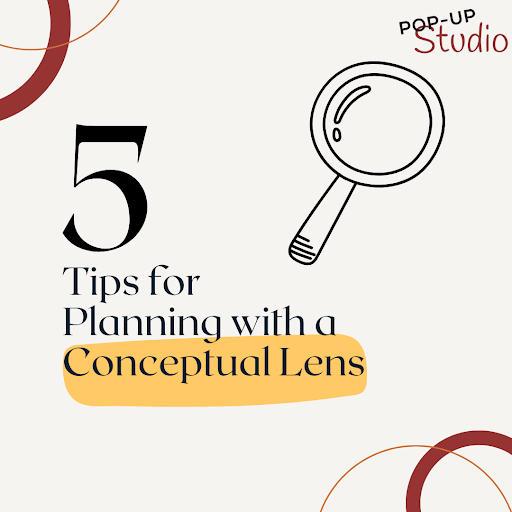Are you ready to skyrocket engagement?
When we plan with concepts in mind, we are able to design experiences that are not only enjoyable but also meet a wide range of educational and developmental needs among our learners.
Teaching that is based on relevant concepts, not just facts, and that involves learners in ‘doing’ rather than ‘absorbing,’ best meets diverse needs and leads to high levels of engagement.
Read on for 5 critical tips for planning to teach for understanding!
Tip #1: See concepts everywhere
Concepts are simply ideas. We can find ideas at play in any situation if we look for them.
Seeking or identifying concepts is fun when we play the game I call: What Concepts Live Here?
Here’s how to play:
Simply look around at your surroundings and ask yourself: What concepts live here?
- If you’re thinking like a mathematician, you might notice evidence of pattern, line, number, measurement, etc.
- If you’re thinking like a scientist, you might see examples of chemical structures, biodiversity, or force and motion (to name a few).
- If you’re thinking like an artist, you might notice colour, shape, composition, form, and so on.
Trying on a variety of conceptual lenses can help us find synergy between disciplines, helping us to create cross-curricular inquiries!
Tip #2: Understand relationships.
It is important to understand the relationship between facts, topics, concepts, and generalizations so we can direct our conceptual thinking. According to Dr Lynn Erickson:
Facts are memorizable knowledge. (“Owls are nocturnal”.)
Topics frame a set of facts. (“Owls”.)
Concepts are mental constructs that come from a topic (“Nocturnal animals,” “adaptations,” “survival”).
Generalizations are Big Ideas. (“Nocturnal animals utilize adaptations in order to survive and thrive in the dark.”)
Dr Lois Lanning’s work helps us to see that Skills, Strategies and Processes are the foundation for conceptual thinking in process-based disciplines. A very simplified definition of each follows. It’s best to access the full definitions and work here:
Skills are the small operations that are embedded in strategies, allowing the strategy to work.
Strategies are systematic plans that combine skills
Processes are actions that define what is to be done.
Tip #3: Differentiate between concepts and foundational material such as topics and skills/strategies/processes.
Concepts meet the following criteria:
- TIMELESS (relevant in past + present),
- ABSTRACT (there are multiple ways to think about the idea), and
- UNIVERSAL (relevant across place + situation).
Concepts are transferrable to new contexts. E.g. “Paris” is a topic and “capital city” is a concept.
Tip #4: Choose the right concepts.
When you choose the right concepts within the contexts you teach, you help learners build breadth and depth.
Aim to apply narrow, subject-specific concepts (e.g., fractions or textures) to develop disciplinary expertise as well as broad concepts (e.g., relationships or systems) to make cross-curricular connections!
Tip #5: Support deeper understanding.
We can support learners in entering concepts and coach them to deeper levels of understanding that are developmentally appropriate. For example:
A simpler big idea might be: A family works together to meet the needs and wants of its members by sharing roles and responsibilities at home.
A more complex idea might sound like: Leaders may govern the affairs of a state by creating policies to meet the needs and wants of its citizenry.
Want to learn more?
Learning firsthand from the source is ideal but not always possible. The founder of Concept-Based Curriculum and Instruction, Lynn Erickson, and her co-author Lois Lanning, are now retired. Rachel offers certification through her business at Professional Learning International. Please consider picking up their book entitled, “Concept-Based Curriculum for the Thinking Classroom” (Corwin, 2017).
I offer concept-focused, inquiry-based training as a certified CBCI consultant.
I facilitate a combination of Lynn and Lois’ research along with my own in an interactive process that helps you understand concepts quickly and confidently.
